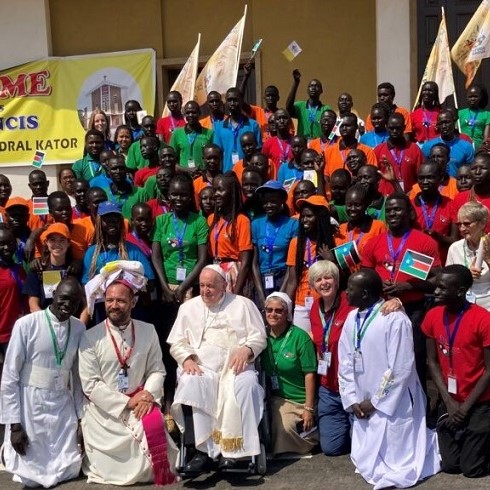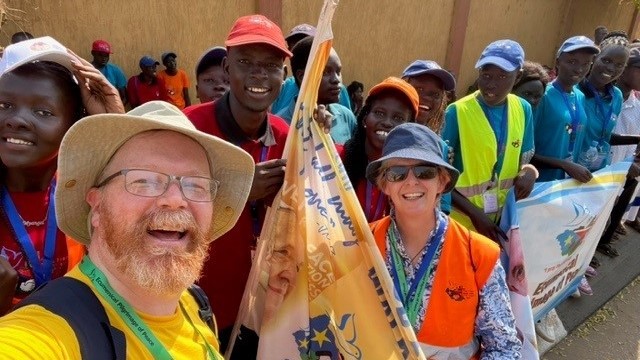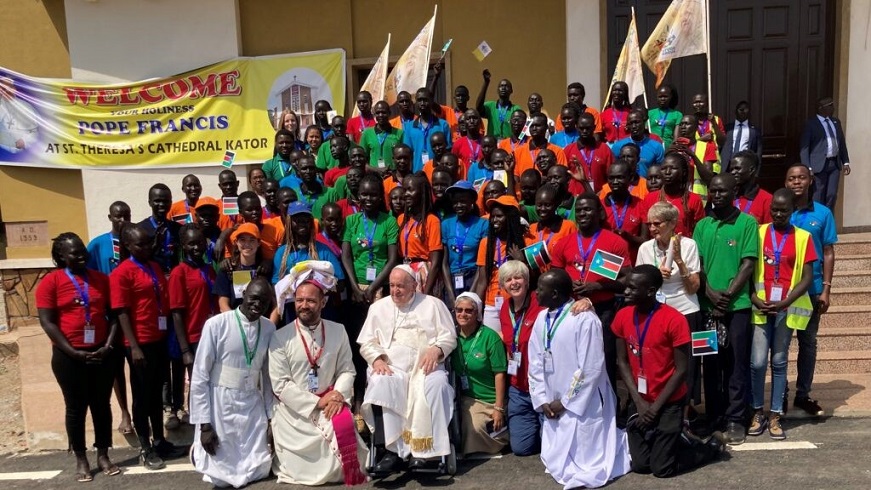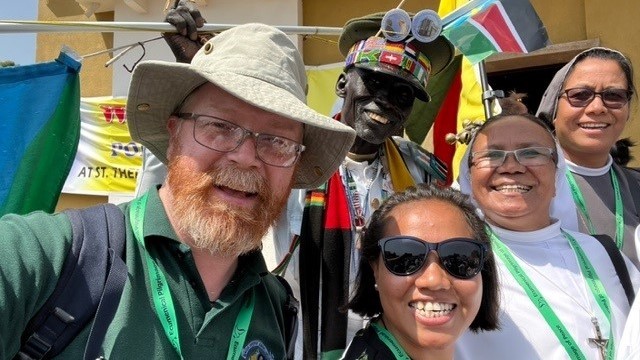MSC and OLSH in South Sudan, a report, Papal visit, by Alan Neville MSC, Irish Province

Juba International Airport is chaotic at the best of times. It is only for the hardiest of travellers, with a sense of reckless abandon, and the sturdiest suitcases. On Friday, the 3rd of February, though, it reached new heights. As I flew back into Juba, the Pope was beginning his ecumenical pilgrimage to South Sudan, along with the Archbishop of Canterbury and the Moderator of the Scottish Presbyterian Church just two hours later. The crowds were heaving with singing and dancing, officials were everywhere waving arms and shouting, and (ironically for a peace pilgrimage) there were plenty of military to make sure everything went without a hitch.
The Vatican, and Pope in particular, have been involved in promoting peace in South Sudan for the last decade. When he met the President and Vice Presidents in Rome in 2019, the Pope stunned those present by getting down on his knees, kissing their feet, and begging that they would work for peace in the world’s newest country. This powerful act of humility demonstrated more beautifully than words ever could how committed he was to building a different future for a people in need of hope.
After dropping off my bags, I joined the group from our Loreto school lining the road to welcome the Pope. If I was tired after my flight, it was nothing in comparison to what they must have been feeling. Over the previous nine days, they had walked as part of a pilgrimage of peace from our school in Rumbek to Juba. A group of ninety students, interns, Religious, and youth walked from village to village on the way to the capital, witnessing to peace. Each evening they performed a play in the marketplace on the theme reconciliation and nonviolence.

“Brothers and sisters, it is time for peace!”
With all the police cars racing up and down the official route, we almost missed the Pope as he drove from the airport in his usual understated Fiat. He was to spend the first day meeting with the President, politicians, and the diplomatic corps. His message was encouraging, but given that twenty-seven people were killed the day before in a vicious revenge attack just three hours outside of Juba, uncompromising:
“Years of war and conflict seem never to end and recently, even yesterday, there have been bitter clashes. At the same time, the process of reconciliation seems stagnant and the promise of peace unfulfilled. May this protracted suffering not be in vain; may the patience and the sacrifices of the South Sudanese, this young, humble and courageous people, challenge everyone and, like the seeds sown in the soil that give life to plants, allow peace to blossom and bear fruit. Brothers and sisters, it is time for peace!”
The following morning the Pope met with priests and religious working around the country in the Cathedral. He remembered those sisters and priests who had been murdered in recent years, but also offered words of encouragement. Immediately afterwards, our youth who had walked from Rumbek had an opportunity to meet the Pope and have their photo taken with him on the steps of the Cathedral. He had heard their story and wanted to meet them personally. To say that they were on cloud nine afterwards would be an understatement. It would be something that they would never forget.

Later that day, the Pope met with internally displaced South Sudanese living around Juba, only a small group of over 2,000,000 people who have had to leave their homes due to flooding or fighting. Many have been living in camps for so long returning will be next to impossible. Mapourdit, where the Daughters of Our Lady of the Sacred Heart minister, was a refugee camp before Independence, but has not become a permanent settlement. Pope Francis agreed with many of the local leaders that this cannot be the way.
“Only with peace, stability and justice can there be development and social reintegration. There is no room for further delay: great numbers of children born in recent years have known only the reality of camps for displaced persons. They have no memory of what it means to have a home; they are losing their connection with their native land, their roots and their traditions. The future cannot lie in refugee camps.”
On Saturday evening the Pope joined Archbishop Welby, the Rev Iain Greenshields, and church leaders from around South Sudan to pray for peace. In particular, they identified the problem of violence against women as a pervasive reality and spoke of the role women have played and will play as peacemakers, justice seekers, and future leaders. The response of the people there was joyous, even if many had to wait hours in 40C heat just to witness it.
Finally, on Sunday, we celebrated Mass with the Pope in the John Garang Memorial Park. It was a capacity congregation, and if you weren’t there by 4:00am, you weren’t getting a seat. When the Pope drove around the site at the beginning giving his blessing, he was greeted by cheers and ululations. In his homily, he spoke of St Josephine Bakhita, one of the patron saints of the country, and her fight from slavery to freedom, overcoming some of the worst challenges imaginable. Instead of becoming embittered by her struggle, she used it to inspire her and those around her to witness to her faith.

“Hope is the word I would leave with each of you, as a gift to share, a seed to bear fruit. As Saint Josephine reminds us, women, especially here, are a sign of hope, and in a special way I thank and bless all the women of the country.”
As the Pope started his journey back to Rome, we hopped onto the bus and joined our rag-tag collection of cars on the drive back to Rumbek. Only last year, this journey would not have been possible due to insecurity, but things are more settled now – hopefully a sign of things to come. Fourteen hours, one flat bus tire, and one broken down car later, we arrived back in Loreto Rumbek. An amazing journey for all of us, but for South Sudan one that is continuing.
Nhialic ke yin,
Fr Alan